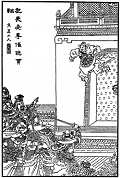 I now have a copy of the criminal complaint filed against Qing Li and it answers a number of questions left open by yesterday’s post on that case. The copy I have isn’t suitable for posting, but I should have one by tomorrow that I can post, and I will then update this post with a link to the criminal complaint.
I now have a copy of the criminal complaint filed against Qing Li and it answers a number of questions left open by yesterday’s post on that case. The copy I have isn’t suitable for posting, but I should have one by tomorrow that I can post, and I will then update this post with a link to the criminal complaint.
The first open issue was whether the accelerometer was an item on the United States Munitions List (USML). The criminal complaint identifies the part as Endevco Part No. 7270A-200K. That item is not listed on Endevco’s website under its product listing. However, if you enter that part number into the ECCN lookup on the site it returns “ECCN:XII(b), which is clearly a reference to Category XII(d) of the USML which covers “military accelerometers.” It may well be that the product is only sold to the military and that is the reason it is not listed on the website with the other accelerometers available for sale to the general public. The part is, however, listed on a page of the Endevco website showing items that are “guaranteed in-stock”
The second open issue was what did Ms. Li know about the export status of the part. If the allegations of the criminal complaint are true, it seems that she would have known that the item was export controlled. Apparently, Ms. Li first approached Endevco, who then reported her to the authorities, who then promptly set up a sting operation. In her first email to the undercover agent, Ms. Li indicates that she had been referred to the undercover agent’s company by Endevco. Thereafter the undercover agent replied with an email that said this:
I do not think that the US Government will give us a license to export these items to China. If you want to, you can apply for a license but I do not want my companies [sic] name on that application. If you still want to proceed without the license, there are ways of doing it.
If true, that could serve as a basis for a finding of criminal intent
Additionally, the criminal complaint reveals an interesting twist on the case. After receiving several emails from the undercover agent, including the one just quoted, Ms. Li appeared to walk away from the transaction and sent an email saying this:
I don’t need the products. I am just actually doing a favor for a friend in China to find the products. I have forwarded all the information to the friend and it’s up to them for the decision now. I have nothing to do with it. I have told the friend that I won’t be involved anymore due to the risk attached. I think they will contact you directly for any further questions. Sorry for any confusion to you.
But she may not have really walked away from the transaction. After her “good-bye” email, the undercover agent was contacted by an individual using the email [email protected] seeking to purchase the accelerometers. The federal investigative agents obtained the IP Address history of that account from Microsoft and it allegedly revealed something very interesting. All of the emails were sent from an IP address in Beijing. But prior to those messages the hotmail account was logged into from an IP address associated with Ms. Li’s husband’s Internet account. Then an intercept on Ms. Li’s phone line revealed a telephone call to a number in Beijing, and thereafter a response was sent from the Beijing IP Address. The criminal complaint speculates that Ms. Li would log into the account and if she saw an email from the undercover agent, she would call her associate in China and discuss the message with him. The associate would then send an email to the undercover agent.
The issue at trial will no doubt revolve around the significance of this IP Address and telephone intercept evidence. And the ultimate significance of that evidence seems far from clear.
 Permalink
Permalink
Copyright © 2007 Clif Burns. All Rights Reserved.
(No republication, syndication or use permitted without my consent.)

 Posted by
Posted by  Category:
Category: 

